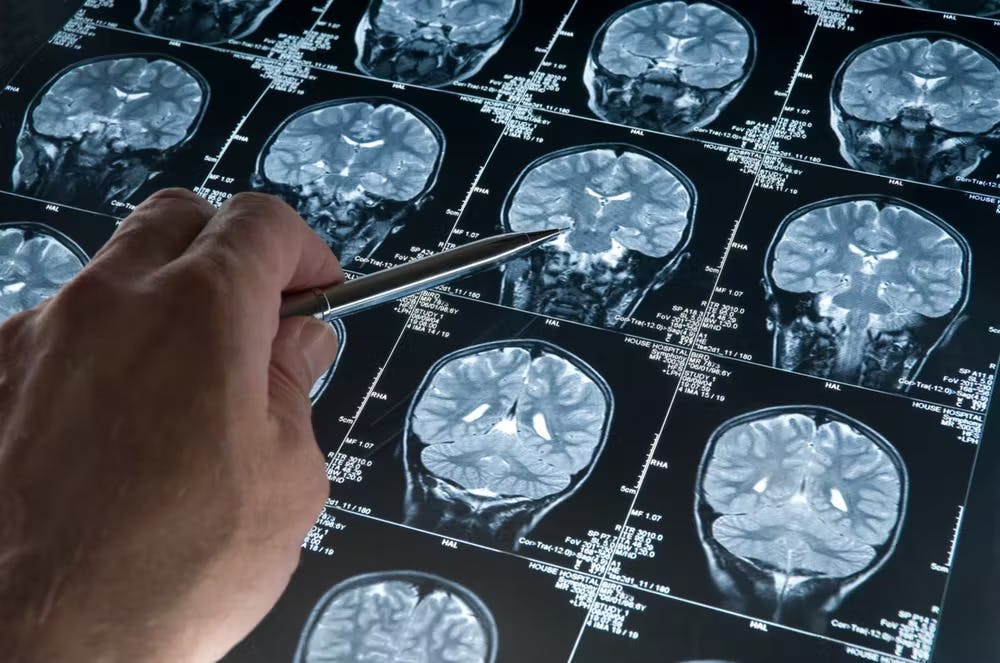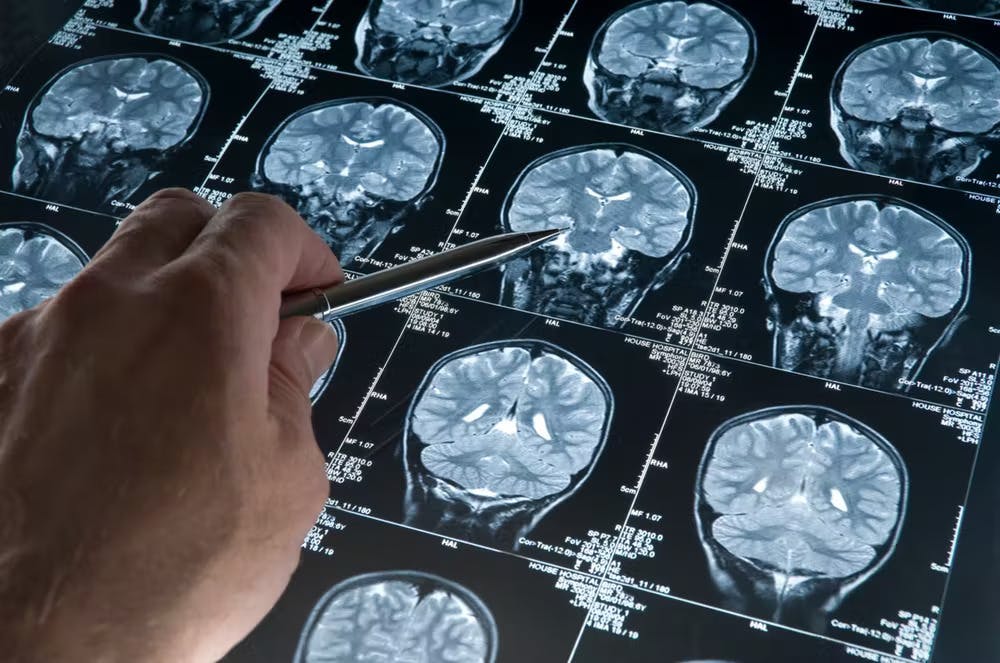ALZHEIMER'S PREVENTION 101

ALZHEIMER'S PREVENTION 101
ALZHEIMER'S
PREVENTION 101

WHAT IS ALZHEIMER'S DISEASE AND DEMENTIA?
Alzheimer's Disease ("AD") is an incurable, slowly progressing fatal brain disease.
AD is the most common cause of dementia. Dementia is a medical diagnosis indicating that someone's trouble with memory or thinking is causing them to be dependent on others to manage their daily living. When the cause of dementia is an abnormal buildup of brain proteins called "amyloid" and "tau," the diagnosis is AD.
WHO CAN GET ALZHEIMER'S DISEASE?
Anyone can get AD, even if they do not have a family history.
Your risk for AD depends on things you can and cannot control. Age and genes are the primary factors that you cannot control that determine your risk for developing AD. The older you are and the higher number of copies of the APOE4 gene you have, the higher your risk for developing amyloid in the brain. Even if you do not have a family history of AD, you may still have teh APOE4 gene. Regardless of age or genes, the overall health of your brain determines your AD risk. Your body health, nutrition and lifestyle are the most important factors you can control.
WHAT CAUSES ALZHEIMER'S DISEASE?
Nobody really knows what causes AD, but it appears to represent a breakdown in the inner connectivity of the brain.
Our human capacity to develop wisdom, language, and empathy is enabled by special regions of the brain that act as hubs between other areas. These brain regions require high amounts of energy to help maintain the brain's internal connections. Without an adequate energy supply, these regions experience metabolic stress, inflammation and ultimately cellular loss. Therefore, any factor that affects energy supply to the brain, or affects strength of brain connections, will influence AD risk.
WHEN DOES ALZHEIMER'S DISEASE BEGIN?
AD begins decades before any symptoms appear.
Doctors have recently discovered that the first stage of the AD process (amyloid build-up in the brain) begins between ten and twenty years before any symptoms occur. This stage of the disease is known as Preclinical AD. Preclinical AD is a symptom-free state of having abnormally high levels of amyloid protein, prior to the onset of tau protein. Preclinical AD can begin as early as age forty, but it can begin any time thereafter. About ten years after Preclinical AD begins, mild cognitive impairment due to AD begins. At this state, the tau protein, in addition to the amyloid protein, has begun to accumulate. Once amyloid, tau and brain cell loss have set in, and symptoms are causing dependency on others, this stage is known as Dementia due to AD. In the past, AD was diagnosed only at the Dementia due to AD stage. Our new understanding has revolutionized the way we think about AD and has introduced many new possibilities for treatments that change the disease course.
ARE THERE CERTAIN GENES THAT INCREASE MY RISK FOR DEVELOPING AD?
Two genes, APOE4 and MTHFR, may increase your risk for developing AD.
People with more copies of certain APOE4 and MTHFR gene variants tend to have higher levels of heart disease, stroke and B12 deficiencies. Heart disease, stroke and B12 deficiency are factors that increase AD risk over time. Therefore, it is useful to know whether you carry one or more of these genes. You can check whether you have copies of these genes through commerical gene testing companies such as 23andMe or AncestryDNA. Gene testing requires informed consent. Genetic counseling is important before and after gene testing. It is important to note that you can still get AD without having the APOE4 or MTHFR genes.
ARE THERE TESTS FOR MEASURING MY CONTROLLABLE AD RISK?
Routine blood tests available through your primary care doctor can help you assess your risk for Preclinical AD.
If you are concerned about Preclinical AD, you can ask your doctor for a routine blood test that checks six numbers. These "brain biomarkers" will measure the function of the body systems that support your brain. These numbers focus on factors you can control. It is important to check these numbers because if they are out of range, you can make simple lifestyle or medical changes to get them on target. Regarding nutrition, your brain needs enough B12 to make the neurotransmitters for brain cell communication (>400ng/dL). You need enough vitamin D to turn on genes for making new connections (>30ng/mL). For circulatory health, your blood needs to be flowing at a normal blood pressure (systolic<120mmHg), in arteries that are free of inflammation (homocysteine<10umol/L). For metabolism, your body needs to be using insulin efficiently (fasting blood sugar<90mg/L and hemoglobin A1C<5.6%) so that your brain stays efficient with its own use of insulin.
To get a more complete assessment of your risk for AD, you can also enroll in an online registry. These registries have access to online memory tests and validated questionnaires designed to help people assess their risk for AD. Examples of registries include Alzheimer's Universe developed by Weill Cornell Medicine (www.alzu.org); the University of California San Francisco Brain Health Registry (www.brainhealthregistry.org), and the Alzheimer's Prevention Registry (www.endalznow.org).
ARE THERE TESTS TO DETERMINE WHETHER I HAVE PRECLINICAL AD?
Two tests to check for Preclinical AD, a PET scan and a spinal tap, can determine whether your amyloid levels are too high.
Currently, people can check for the amyloid protein through a spinal tap or a special brain scan called a PET scan. A spinal tap or PET scan can identify higher than normal amyloid levels that are characteristic of Preclinical AD. These tests are not paid for by insurance. These tests must be done in conjunction with a doctor. They are not recommended for everybody. They may be useful for people at the highest risk lvels. You can pay out of pocked for them, or you can enroll in AD prevention studies that typically offer these and other tests as part of the study protocol. These studies not only test for the amyloid protein, but also offer treatments to slow its accumulation in the brain if it is found to be too high.
WHAT CAN I DO TODAY TO STRENGTHEN MY BRAIN FOR LIFE?
Everybody can strengthen their brain by getting enough nutrients in their daily diet.
A diet that includes fruit, vegetables, whole grains, legumes and foods high in omega 3s plus herbs, spices, fermented foods and natural sweeteners provides enough essential nutrients (color pigments, Omega healthy fats, fibers, vitamins and minerals) to support the body systems that promote the brain. If you are like most Americans, you may be getting less than half of the recommended daily intake of your essential brain nutrients. Eating this way is a fun way to help your body naturally reach its brain biomarker targets. Besides nutrition, lifestyle choices such as engaging in regular physical activity, getting adequate rest, nurturing deep social connections and staying active in lifelong learning are natural ways to strengthen your body and brain, for life.
Download this blog here.

